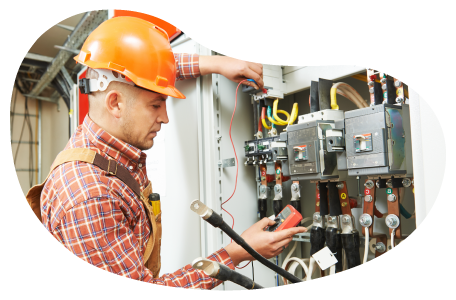
Why do electricians need insurance?
Fires, injuries from live wires, and accidental damage to a client's home are risks for every electrician. Avoid costly downtime and losses with affordable electrician insurance from top providers.

Find the right coverage
Insureon's licensed agents help electricians find policies that match their unique risks. Fill out our free online application to compare quotes from top-rated providers.
With the right insurance, you'll gain protection against financial losses and fulfill the requirements you need to run your business.
What types of business insurance do electricians need?
These insurance policies cover the common risks electrical contractors face.
General liability insurance
General liability coverage helps electricians pay for common third-party accidents. Bundle with commercial property insurance for savings in a business owner's policy (BOP).
- Customer bodily injury
- Damaged customer property
- Products-completed operations coverage
Business owner's policy
A BOP bundles general liability coverage and commercial property insurance at a discount. It's often the most cost-effective type of insurance for electricians.
- Accidents that injure clients
- Client property damage
- Stolen or damaged business property
Workers’ compensation insurance
Most states require workers' comp insurance for electrical businesses with employees. For sole proprietors, it covers workplace injuries that your health insurance might deny.
- Medical expenses from work-related injuries and illnesses
- Disability benefits
- Employee injury lawsuits
Commercial auto insurance
This policy is required for vehicles owned by an electrical business. It covers third-party medical bills and property damage in the event of an auto accident.
- Physical damage and collision coverage
- Third-party medical costs
- Vandalism and theft
Contractor’s tools and equipment insurance
This type of inland marine insurance helps pay for the repair or replacement of an electrical contractor’s voltage testers, wire strippers, and other tools and equipment.
- Equipment less than five years old
- Equipment that travels to job sites
- Small tools
Professional liability insurance
A professional liability insurance policy covers legal expenses when an electrician's mistake or missed deadline leads to a lawsuit. It's also called errors and omissions insurance (E&O).
- Accusations of negligence
- Failure to complete electrical work on time
- Failure to deliver results as promised
How much does electrician insurance cost?

An electrical contractor working on their own will pay less for insurance than a business with several electricians. Factors that affect electrical contractor insurance costs include:
- Services offered, such as residential or commercial wiring
- Value of business property and equipment
- Business size and revenue
- Types of small business insurance purchased
- Policy limits, deductibles, and endorsements
How do I get electrical contractor's insurance?
It’s easy to get insurance coverage and surety bonds as an electrical contractor or company if you have your business information on hand. Our insurance application will ask for basic facts about your small business, such as revenue and number of employees. You can buy a policy online and get a certificate of insurance with Insureon in three easy steps:
- Complete a free online application
- Compare insurance quotes and choose policies
- Pay for your policy and download a certificate
Insureon's licensed insurance agents work with top-rated U.S. insurance companies to find the most affordable coverage that fits electrician businesses, whether you work independently or hire employees.
Common questions about electrician insurance
Review answers to frequently asked questions about electrician insurance.
Do electricians need a license, permit, or bond?
Most states and municipalities require electricians to be licensed, as well as carry certain types of insurance and bonds.
Even in states that don’t require electricians to be licensed, you might still need a license at the local level to work as an electrician.
In most cases, you’ll likely have to work for about four years as an apprentice in the electrical trade, performing electrical services under the supervision of a master electrician, before you're eligible to take a licensing exam within your state.
Beyond licensure, having proper permits shows you run a legitimate, reputable business, and buying insurance and bonds reassures clients they won’t be held liable for damages if something goes wrong during a costly project.
Some insurance and bonds are often required by your state and local government, like workers' compensation, commercial auto, or various types of surety bonds.
What insurance coverage does a self-employed electrician need?
There are several important reasons for independent contractors, subcontractors, and other self-employed individuals to carry insurance. You may need insurance to sign a contract or lease, comply with the law, gain client trust, and protect your business from catastrophic losses.
The law in several states requires workers' comp coverage for construction contractors, even if they work alone, due to the high risk of injury. And most states require businesses with work vehicles to have a commercial auto policy. You might also be required to have surety bonds and a general liability policy.
Even if not mandated by your municipality or state, there are several policies a self-employed electrician should carry for peace of mind and protection from devastating losses. These include:
- Workers' compensation insurance can protect a self-employed individual if they are hurt on the job and unable to work while they recover. Private health policies usually won't cover medical payments for work-related injuries or illnesses.
- Commercial auto insurance covers your legal fees, medical expenses, and property damage to others if your work vehicle is involved in an accident.
- General liability coverage insures you against common business risks like customer injuries, customer property damage, and advertising injuries.
It's important to first check with your state, county, and local governments to ensure you meet any and all requirements and coverage limits for your business.
When do electricians need commercial auto insurance?
Every state—except for New Hampshire and Virginia—requires commercial auto insurance for business-owned vehicles. If you use a personal vehicle for work, it's important to know that your private auto insurance policy won’t cover you in the event of a work-related accident.
A commercial auto policy offers liability protection when you or an employee gets into an accident while driving a company vehicle. It can pay for any property damage or injuries caused by your business vehicle, as well as legal expenses. It can also cover medical expenses for yourself or an employee in a work vehicle accident.
If you or your employees use any personal, leased, or rented vehicles for work, you'll need hired and non-owned auto (HNOA) insurance because your personal or commercial auto insurance policies won’t cover any accidents that happen in personal, leased, or rented vehicles during work-related activities.
Do I need professional indemnity insurance as an electrician?
Professional indemnity insurance, also called professional liability insurance, protects your electrician business should a client sue you over an error, mistake, or negligence that negatively impacted them.
State laws don’t often require businesses to carry professional liability insurance. However, it's particularly useful for businesses that primarily sell industry expertise and knowledge rather than physical products.
For example, electricians should carry this coverage in the event a client accuses them of improperly wiring their new home and as a result, it doesn't pass inspection. The client could sue them for the cost of having the project redone and the home inspection fees.
Claims protected by professional indemnity insurance include:
- Professional negligence
- Breach of contract
- Oversights and errors
- Breach of confidentiality
- Poor professional advice
- Missed deadlines and undelivered services
No matter how careful you try to be, human error is inevitable, and the out-of-pocket costs associated with legal action can be expensive. Having the right professional liability insurance policy can protect your business in the event of an unsatisfied customer lawsuit.
How do I find cheap liability insurance for electricians?
It's easy to find affordable electrician liability insurance that matches your risks and budget. One way is to review rates from different insurance carriers, and with Insureon's easy online application you're able to get free quotes from several companies.
There are a few other ways a small business owner can save, such as:
- Bundling policies. The most popular option is a business owner's policy (BOP), which pairs your general liability policy with property insurance to save money.
- Customizing policies. You can choose lower limits, a higher deductible, or certain exclusions to save on your premium.
- Focusing on safety. Fewer accidents means fewer liability claims, which helps lower your insurance costs.
Learn more about how to find cheap business insurance for construction and contracting professionals.
Hear from customers like you who purchased small business insurance.
